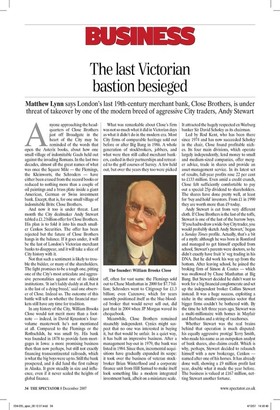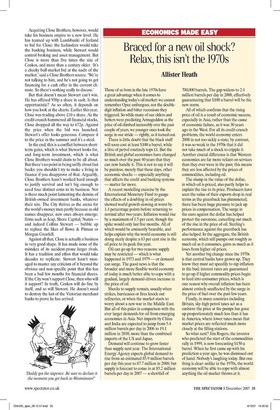The last Victorian bastion besieged
Matthew Lynn says London's last 19th-century merchant bank, Close Brothers, is under threat of takeover by one of the modern breed of aggressive City traders, Andy Stewart Anyone approaching the headquarters of Close Brothers just off Broadgate in the heart of the City may be reminded of the words that open the Asterix books, about how one small village of indomitable Gauls held out against the invading Romans. In the last two decades, almost all the great names of what was once the Square Mile — the Flemings, the Kleinworts, the Schroders — have either been erased from the record books or reduced to nothing more than a couple of oil paintings and a brass plate inside a giant American, German or Swiss investment bank. Except, that is, for one small village of indomitable Brits: Close Brothers.
And now it too is under threat. Last month the City dealmaker Andy Stewart tabled a £1.2 billion offer for Close Brothers. His plan is to fold it into his much smaller Cenkos Securities. The offer has been rejected but the future of Close Brothers hangs in the balance. If it goes under, it will be the last of London's Victorian merchant banks to disappear, and it will take a slice of City history with it.
Not that such a sentiment is likely to trouble the bidder, or many of the shareholders. The fight promises to be a tough one, pitting one of the City's most articulate and aggressive personalities against one of its oldest institutions. 'It isn't fuddy-duddy at all, but it is the last of a dying breed,' said one observer of Close. Indeed so. The outcome of this battle will tell us whether the financial markets still have any time for tradition.
In any history of the City, William Brooks Close would not merit more than a footnote — indeed, in David Kynaston's fourvolume masterwork he's not mentioned at all. Compared to the Flemings or the Rothschilds, he was small fry. His bank was founded in 1878 to provide farm mortgages in Iowa: a more promising business then than now perhaps, but still not exactly financing transcontinental railroads, which is what the big boys were up to. Still the bank prospered, and it did fund the first railway in Alaska. It grew steadily in size and influence, even if it never scaled the heights of global finance.
What was remarkable about Close's firm was not so much what it did in Victorian days as what it didn't do in the modern era. Most City firms of comparable heritage sold out before or after Big Bang in 1986. A whole generation of stockbrokers, jobbers, and what were then still called merchant bankers, cashed in their partnerships and retreated to the golf courses of Surrey. A few held out, but over the years they too were picked off, often for vast sums: the Flemings sold out to Chase Manhattan in 2000 for $7.7 billion; Schroders went to Citigroup for £1.3 billion; even Cazenove, which for years snootily positioned itself as the blue-blooded broker that would never sell out, did just that in 2004 when JP Morgan waved its chequebook.
Meanwhile, Close Brothers remained staunchly independent. Cynics might suspect that no one was interested in buying it, but that would be unfair. In a quiet way, it has built an impressive business. After a management buy-out in 1979, the bank was listed in 1984. Since then, incremental acquisitions have gradually expanded its scope: it took over the business of veteran stockbroker Brian Winterflood and a corporate finance unit from Hill Samuel to make itself look something like a modern integrated investment bank, albeit on a miniature scale.
It attracted the hugely respected ex-Warburg banker Sir David Scholey as its chairman.
Led by Rod Kent, who has been there since 1974 and has now succeeded Scholey in the chair, Close found profitable niches. Its four main divisions, which operate largely independently, lend money to small and medium-sized companies, offer merger advice, trade in shares and provide an asset-management service. In its latest set of results, full-year profits rose 22 per cent to £133 million Even amid a credit crunch, Close felt sufficiently comfortable to pay out a special 25p dividend to shareholders. The shares have done pretty well, at least for 'buy and hold' investors. From £1 in 1990 they are worth more than £9 today.
Andy Stewart is cut from very different cloth. If Close Brothers is the last of the toffs, Stewart is one of the last of the barrow boys. 'If you had to draw a wide-boy City trader, you would probably sketch Andy Stewart,' began a Sunday Times profile. Actually, that's a bit of a myth: although he was born in Romford and managed to get himself expelled from school, Stewart's parents were doctors, so he didn't exactly have fruit 'n' veg trading in his DNA. But he did work his way up from the bottom. After leaving school, he joined the broking firm of Simon & Coates — which was swallowed by Chase Manhattan at Big Bang. But Stewart decided he didn't want to work for a big financial conglomerate and set up the independent broker Collins Stewart instead. It was a huge success, exploiting a niche in the smaller-companies sector that bigger firms couldn't be bothered with. By the time he left three years ago, Stewart was a multi-millionaire with homes in Mayfair and Barbados and a string of racehorses.
Whether Stewart was the real brains behind that operation is much disputed: his equally aggressive protégé Terry Smith, who made his name as an outspoken analyst of bank shares, also claims credit. Which is why, perhaps, Stewart decided to relaunch himself with a new brokerage, Cenkos — named after one of his horses. It has already done well, showing a £9 million profit last year, double what it made the year before. The business is valued at £167 million, netting Stewart another fortune.
Acquiring Close Brothers, however, would take his business empire to a new level. He has teamed up with Landsbanki of Iceland to bid for Close: the Icelanders would take the banking business, while Stewart would control broking and asset management. But Close is more than five times the size of Cenkos, and more than a century older. 'It's a cheeky bull-market bid at the nadir of the market,' said a Close Brothers source. 'We're not talking to him, and he's not going to get financing for a cash offer in the current climate. So there's nothing really to discuss.'
But that doesn't mean Stewart can't win. He has offered 950p a share in cash. Is that opportunistic? As so often, it depends on how you look at the charts. Earlier this year, Close was trading above £10 a share. As the credit crunch hammered all financial stocks, Close dropped all the way to 672p. Against the price when the bid was launched, Stewart's offer looks generous. Compare it to the price in the summer and it's a steal.
In the end, this is a conflict between shortterm gains, which is what Stewart looks for, and long-term investment, which is what Close Brothers would claim to be all about. But there's no point in being sniffy about fast bucks: you shouldn't try to make a living in finance if you disapprove of that. Arguably, Close Brothers hasn't worked hard enough to justify survival and isn't big enough to need four distinct arms to its business. Nor is there much point lamenting the demise of British-owned investment banks, whatever their size. The City thrives as the arena for the world's money men partly because as old names disappear, new ones always emerge: firms such as Icap, Shore Capital, Numis — and indeed Collins Stewart — bubble up to replace the likes of Rowe & Pitman or Morgan Grenfell.
Against all that, Close is actually a business in very good shape. It has made none of the mistakes of its accident-prone larger rivals. It has a tradition and ethos that would take decades to replicate. Stewart hasn't managed to muster any criticism of it beyond the obvious and non-specific point that this has been a bad few months for financial shares. If the City won't support Close, then who will it support? In truth, Cenkos will do fine by itself, and so will Stewart. He doesn't need to destroy the last of the Victorian merchant banks to prove he has arrived.


























































 Previous page
Previous page